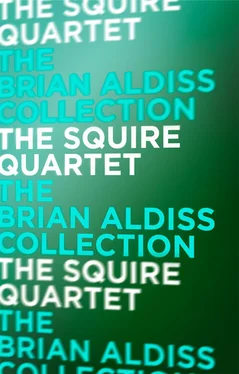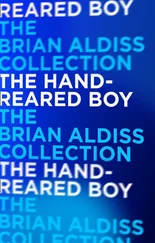‘I thought so too.’
‘Of course, the decent ones generally turn out to be KGB men, don’t they?’
In the foyer, Squire checked his stride and went to look at the rack of postcards.
‘We shan’t see much of the island. Might as well buy a postcard.’
‘Well, I will detain you no longer. Some of the more important people here will wish to speak with you.’
‘Oh, don’t say that, Herr Fittich. I’m delighted to have your company. Look at this, the Villa Igiea. Beautiful, eh? I’d like a villa right there, pitched on the cliff.’
He waved a postcard of the ruins of a Roman dwelling, reduced to no more than half a dozen columns, set on the edge of the sea among pines, looking out to distant islands.
‘You also have a pleasant house in England, Pippet Hall,’ said Fittich.
Squire turned to face him. ‘Why do you say that?’
Fittich looked nervous. ‘My apologies, I should not have made the silly remark. To be honest with you, in the spring I visited your home in Norfolk. Pippet Hall. It was when your television series was actually being shown and your name was everywhere. I happened to stay with an English friend who, like me, is an admirer of your series. Well, we passed by your gates. I was astonished to find such a grand house visible from the road, not hidden, and close to the village, unlike most fine houses.
‘To be frank with you, I stuck my camera through your gates. You will think it a terrible cheek. And as I was about to snap, a charming lady appeared in my lens, strolling along with a young man towards the gate. It was exactly what I needed to complete the composition. I opened the gate for her. She smiled at me and said she hoped I had got a good shot. Back at my friend’s car, I looked at the photograph of you with your family on the back jacket of your book. It was your wife I had passed a word with. We drove off, I in great delight. And it turned out to be a good picture. I should have had the decency to have posted your wife a copy of it.’
‘I’m glad it turned out well. Excuse me, I’ll see you later.’
Looking slightly puzzled at Squire’s abruptness, Fittich said, ‘My apologies for detaining you. But knowing you would be here as our star guest, I brought you a copy of the photograph. Please allow me.’ As he spoke, he was bringing a leather wallet from the inner pocket of his jacket. He removed a colour print from the recesses of the wallet and, smiling, passed it to Squire.
The house in its mellow red brick appeared to nestle among trees and the giant rhododendron bushes which served as windbreaks on its east side. All looked serene and peaceful in the spring sun. In the foreground was Teresa Squire, wrapped in a warm coat, her head on one side with a gesture of suspicion directed at the intrusive photographer; it was a look Squire knew well. By her side, but hanging back, perhaps also in response to the sight of a camera, was a lean young man in jeans, his narrow face notable chiefly for sharp side-whiskers.
As a look of pain passed across Squire’s face, Fittich said, ‘Did you wish to keep this print? I trust that your wife is well, Mr Squire?’
‘We were parted when you took this shot. Thanks, but I don’t want it – not because of her.
‘Because of him.’
Upstairs in Room 143, Squire locked the door and took off his shirt and trousers. He sat by one wall in the lotus position, gazed at the wall before him, and practised pranayama. A yogi in Southall had once told him that, through correct breathing, modern man could regenerate himself; Squire, who liked to hope, partly believed the yogi.
Nevertheless, when he rose to his feet twenty minutes later, he was left with a desire to phone England, and to be informed. He put through a call, not to his wife or his sister, but his London publisher, Ron Broadwell of Webb Broadwell Ltd.
After an hour’s wait, the number rang, and Broadwell’s secretary came on the line. ‘Hello, Mr Squire, I’m afraid Mr Broadwell’s out. Can I help?’
‘Oh, I just wondered if Ron had any news for me.’
‘Yes, we heard this morning that your American publisher has put a reprint of 20,000 copies in hand. So that’s good, isn’t it?’
‘Splendid. Is Ron at lunch?’
‘Yes, he’s still at lunch. He should be back by four. I’ll tell him you rang.’
The genial Ron Broadwell was lunching – unknown to the world – with Squire’s sister, Deirdre Kaye. They lunched together once a year in the Hyde Park Hotel, Knightsbridge, and had done so ever since the fifties when, as undergraduates at Cambridge, they had consummated a brief love affair in the hotel. Since then, both had married Americans, and the affair was long over.
They remained good friends and still enjoyed their secret annual meeting. This year it was Deirdre’s turn to pay. A delegation of Chinese in sober business suits was eating Dover sole in unison at a nearby table. Deirdre and Broadwell had both ordered cotelettes d’Agneau Madelon, and were drinking a claret with them.
‘I saw your mother’s obituary in The Times,’ Broadwell said. ‘Tom didn’t expect me to come up to Hartisham for the funeral, did he?’
‘Good God, no. But we’ve met since then. That was the Christmas before last.’
He looked embarrassed. ‘I lose account of the time nowadays. So it was.’
‘You’re not having an affair with another woman, are you?’
‘I promised always to be faithful to you. The lamb’s good.’
‘Looking back, I can see what a snob she was. I suppose that generation were. The Hodgkinses do tend to be. I remember mother’s advice to me on my twenty-first. “Always look first-rate,” she said. “Dress becomingly, wash thoroughly, particularly between the legs, always hold yourself properly. Keep a fit expression on your face at all times. Remember you’re a Squire, gel.”’
She had given a precise imitation of her mother, and Broadwell laughed. ‘She was rather grand. “Always look first-rate.” I like that. She did look a bit first-rate.’
‘Oh yes. Those hats. Drank like a fish towards the end. Tom preferred not to notice. Tom likes to maintain the family image.’ The cutlets were tiny, delicately done, and served with a sauce Madère; she cut one in half and raised it to her mouth.
‘It’s quite a relief to be married to old Marsh. As an American, he doesn’t grasp all the implications of being a Squire gel, so I’ve escaped all that. More or less.’
Broadwell gazed at her over his glass. In her late forties, Deirdre Kaye had grown rather like her brother. There were the same strong features, the same marked lines beside the mouth, even the same way of carrying the head. He enjoyed their relationship, and was not sorry that it was no closer. He also reflected that she was more Squire-like than her brother.
‘Belinda simplifies my life. “Cut out all that English bullshit,” she’ll say. Not that she hasn’t plenty of bullshit of her own. By the way, she informs me that The Times may cease publication. Staff troubles – the unions, of course. Can you credit it? Life won’t be the same. I’m one publisher who’ll suffer if the TLS goes.’
‘Belinda’s fun for you, Ron. What you deserve. They are tasty, aren’t they?’
‘Was Tom very upset by Patricia’s death?’
‘You know Tom. Nothing upsets him. One of his worst characteristics. Now he is head of the family, etc. We don’t see much of Adrian, except at Christmas. I guess being a Squire boy is a bit of a responsibility. Notice Tom always looks first-rate. Ideal telly fodder.’
‘He came over very well on the box. More wine? How is his relationship with Teresa? I daren’t ask him, not after the great bust-up at my house last New Year’s Eve.’
‘I’m getting such an alcoholic in my old age. It’s all a mess. I suppose you know he’s not actually at Pippet Hall any more? First he stayed at his club, now he’s got a flat somewhere in Paddington, of all places.’
Читать дальше












